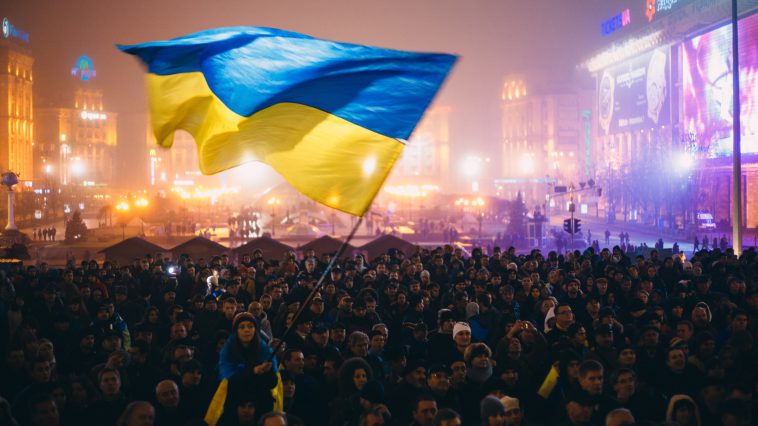From the Atlas Network. Read the original article here…
Story by Eric D. Dixon
NEWS OF PROTESTS AND SOCIAL UNREST IN OTHER COUNTRIES can seem remote and impersonal, because it’s easy to focus on the sweep of the economic and political forces in play without seeing the millions of individual lives struggling to survive. For people in the middle of that turmoil, though, it’s an intensely personal matter of life and death. In February 2014, Yuliya Tychkivska found herself in the middle of a revolution. Anti-government demonstrations in Kyiv — the “Euromaidan” movement, also known as the Revolution of Dignity — protested years of corruption and economic stagnation in Ukraine. They were met with brutal violence from police forces that killed dozens of people and injured more than 1,000.
“There are tears streaming down my face and I don’t know if it is from the tear gas they used last night, or from the sight of seeing friends killed beside me,” Tychkivska wrote to Atlas Network Director of Outreach Stephanie Giovanetti Lips during the conflict. “But we’re going back out to the Euromaidan tonight. Our country is at a crossroads and we can’t afford to lose.”
 “Our country is at a crossroads and we can’t afford to lose.”
“Our country is at a crossroads and we can’t afford to lose.”
—YULIYA TYCHKIVSKA, VICE PRESIDENT FOR MANAGEMENT EDUCATION AT THE KYIV SCHOOL OF ECONOMICS AND A CO-FOUNDER AND TRUSTEE OF THE BENDUKIDZE FREE MARKET CENTER
Yuliya Tychkivska
They ultimately won that battle. After Ukraine’s corrupt former President Viktor Yanukovych signed a political compromise and agreed to new elections at the end of the year, he abandoned the country in disgrace. The new focus of Ukraine’s protest movement was how to move forward after the revolution. Tychkivska had been working for economics professor Pavlo Sheremeta, who was suddenly appointed to lead Ukraine’s Ministry of Economic Development and Trade, so she found herself in a position to help make a difference.

KYIV, UKRAINE—FEBRUARY, 2014. PROTESTORS GATHER IN INDEPENDENCE SQUARE. PHOTO CREDIT: VADVEN / SHUTTERSTOCK.COM
Tychkivska helped organize an Emergency Economic Summit for Ukraine less than a month after the revolution, along with Dr. Tom G. Palmer, Atlas Network’s executive vice president for international programs, and the late Kakha Bendukidze, a businessman and free-market leader who had also served in several appointed positions in the governments of both Ukraine and Georgia. The summit drew experienced reformers from Latvia, Slovakia, Poland, Georgia, Sweden, Russia, and Bulgaria, and attracted more than 650 attendees and 100 reporters. It brought widespread public attention to the importance of economic freedom, individual liberty, property rights, and sound money, as well as the need to denationalize industries and slash taxes, spending, and regulatory red tape.
Since then, the free-market reform movement has grown in Ukraine. Two years ago, there were no Ukrainian Atlas Network partners, but today there are five. Tychkivska co-founded the Bendukidze Free Market Center, named in memory of her friend and colleague, and Ukraine is also home to Reed.Media, the Ukrainian Economic Freedoms Foundation (UEFF), the Center for Social and Economic Research (CASE Ukraine), and EasyBusiness. Each organization is blazing new pathways toward a freer, more prosperous, and more peaceful and secure Ukraine.
Still, Ukraine remains in a precarious position. The country’s post-revolutionary government has edged forward with modest new reforms, but it has inherited tremendous economic and institutional challenges. Ukraine is ranked 135th out of 159 countries in the Fraser Institute’s 2016 “Economic Freedom of the World” report (the most recent data are from 2014), and 130th out of 168 on Transparency International’s Corruption Perceptions Index 2015. Russian military incursions into and occupation of Ukrainian territory — and, in the case of Crimea, outright annexation — has led to ongoing violence on Ukrainian territory, a drain of resources to build a national defense force, substantial refugee populations, and disruption of economic relations and activities. It has also been only 25 years since Ukraine was still part of the communist Soviet Union, and much of the Soviet legacy has remained.
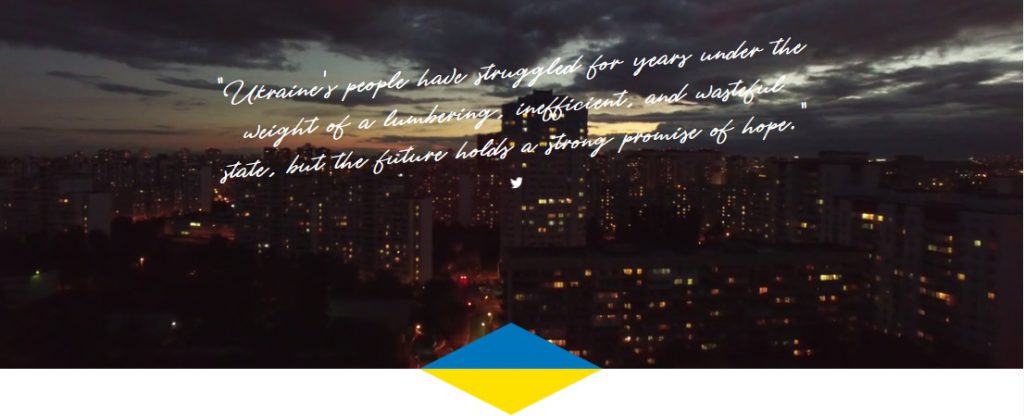
THE SLOW PACE OF CHANGE
Ukraine’s people have struggled for years under the weight of a lumbering, inefficient, and wasteful state, but the future holds a strong promise of hope. The current transition period represents a new opportunity to shore up property rights, strengthen the rule of law, reduce the burden of government, and open markets to investment, both domestic and international. President Petro Poroshenko, who was elected to the office in May 2014 in the wake of Yanukovych’s departure, has initiated a series of institutional reforms along with a parliament that refreshed its membership through new elections in October 2014. The country is still in the early stages of long-term change, and its geopolitical footing is still uncertain.
“Ukraine is starting to make positive changes, but the pace has been slow,” said Tychkivska, who is today vice president for management education at the Kyiv School of Economics and a co-founder and trustee of the Bendukidze Free Market Center. The organization is named after the late champion of the post-Soviet liberty movement Kakha Bendukidze, who also spearheaded the transformation of the Georgian economy through an ambitious and entrepreneurial program of bureaucracy reduction, privatization, elimination of import taxes, liberalization of the country’s tax laws and labor code, and reform of the judicial and police services.
Georgia may serve as a model for a successful market-oriented reform campaign, but replicating that success across the Black Sea in Ukraine will require great effort and persistence. Reforms in Ukraine have been particularly slow in the areas of decentralization, competition policy, and governance, although there has been some success in improving public finance, rehabilitating the banking system, and deregulating business and the energy sector. There have been positive legislative changes, but shakedowns of businesses and special privileges for connected interests remain obstacles to the ability of free markets to create prosperity.
 “Despite the victory of the Revolution of Dignity, Ukraine remains closed and corrupt.”
“Despite the victory of the Revolution of Dignity, Ukraine remains closed and corrupt.”
—VLADIMIR FEDORIN, ONE OF THE COUNTRY’S MOST PROMINENT JOURNALISTS AND FOUNDING PRESIDENT OF THE BENDUKIDZE FREE MARKET CENTER
“Ukraine is the most corrupt, the most economically unfree, and the poorest (after Moldova) European country,” said Vladimir Fedorin, one of the country’s most prominent journalists and founding president of the Bendukidze Free Market Center. “Despite the victory of the Revolution of Dignity, Ukraine remains closed and corrupt with the omnipresent red tape inhibiting the development of the private sector. The reforms that have been carried out by the government since Maidan under pressure from Western allies and the civil society cannot lead the country on the path of rapid economic growth for they are mostly half-measures, incapable of dealing with overwhelming bureaucracy, corruption, and resistance to change, among other negative consequences of our Soviet heritage. In addition to the above-mentioned issues, Ukraine faces foreign military intervention that is draining its resources and is unlikely to end anytime soon.”
TRANSFORMING THE INTELLECTUAL CLIMATE
For the past two years, Reed.Media has kept up with the dizzying array of changes in Ukraine and other countries of the former Soviet Union that are forging new paths after their liberation from behind the Iron Curtain. In addition to its extensive coverage and analysis of world news as part of its operations as an online magazine, Reed.Media organizes lectures and conferences that bring experts from across the globe to discuss the process of institutional reform, the dangers of populism and demagoguery, strategies for fighting corruption, how to eliminate other obstacles to freedom and prosperity, and much more. In 2015, Reed.Media merged its activities with the Bendukidze Free Market Center to coordinate the provision of information and analysis to readers of Ukrainian and Russian.
“From my point of view, the biggest challenge is the need to change the intellectual climate,” said Viacheslav Dvornikov, editor of Reed.Media. “Ukraine needs pro-freedom ideas to be mainstream, in order to become a truly free society. Even young people tend to have prejudices, to be closed-minded and to believe in myths — attitudes that are often exploited by unscrupulous populists. My first instinct was that the most important challenge was the lack of reforms in Ukraine, especially economic reforms, but as I have reflected further, I have realized that ideas come first.”
Reed.Media’s annual Free Generation Forum conference, organized in Kyiv in cooperation with European Students for Liberty, spreads those ideas in a unique way through its focuses on the challenges and shared experience of today’s rising generation of post-communist countries.
“We have a common past, a different present, and our future depends on us,” Reed.Media explains (in Russian) on its website. “We are the first generation born after the Soviet Union’s collapse in countries in which the most important values — individual freedom and self-expression, private property and the free economy, human precedence over the state machinery, and a world without borders — were outlawed for 70 years. Some post-Soviet countries have been more successful on the path of reform, and others faced more difficult changes, but free people must once again fight against the restoration of dictatorship.”

MASHA TCHERNAYA, A PHOTO EDITOR FOR REED.MEDIA, HAS BEGUN TO CAPTURE THE STOREIS OF YOUNG PEOPLE WHO ARE LEARNING TO NAVIGATE LIFE IN UKRAINE’S TRANSFORMING SOCIETY AND ECONOMY IN HER SERIES OF “FREE GENERATION” PROFILES. PICTURED ARE KATE (LEFT), A 14-YEAR-OLD STUDENT, AND EUGENE (RIGHT), A BARISTA. THESE, AND MANY OTHERS, ARE EACH USING THEIR UNIQUE SKILLS TO FURTHER THE CAUSE OF FREEDOM IN A VARIETY OF WAYS.
Masha Tchernaya, a photo editor for Reed.Media, has begun to capture the stories of some of those young people who are learning to navigate life in a transforming society and economy. Each are using their unique skills to further the cause of freedom in a variety of ways. In her first set of “Free Generation” profiles, Tchernaya’s interview subjects included Igor, a 26-year-old programmer, who was raised in a hostel and hopes for a future filled with family, literature, art, and professional success; Yefim, a 27-year-old graphic designer, who sees millions of new possibilities in a future of change and uncertainty; Eugene, a 21-year-old barista, who sees in young Ukrainians a generation that hungers for purpose and is exploding with fresh ideas; Julia, a 27-year-old musician, who sees freedom as a continual process of experimentation, failure, learning, recovery, and through that process the opportunity to realize happiness; and Kate, a 14-year-old who finds her sense of freedom in tolerance and community. These young people, and many others like them, will be the generation that builds a new Ukraine.
“We have a difficult future,” Igor said (in Russian), noting that it can be a long and difficult process to convert a poor country’s economy to freedom and prosperity. “Crises await us one after the other, plus there is now a global crisis of values, when views that are opposed to an open society are beginning to dominate. Those views are popular because they seem to provide guidance in an incomprehensible, uncontrollable world.”
We are the first generation born after the Soviet Union’s collapse in countries in which the most important values were outlawed for 70 years.
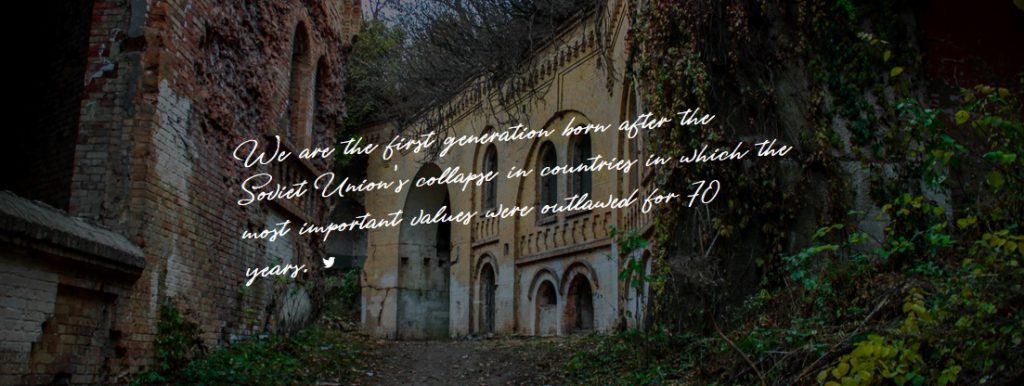
CREATING AN AGENDA FOR REFORM
In order to help Ukraine successfully navigate the turbulent creative destruction that is an inevitable part of any transforming societal landscape, Atlas Network partners have created multifaceted programs to reform and reduce the powers of government, secure the rights and liberties of the people, free the markets, and create the institutional infrastructure for prosperity and security.
“I believe we should move in two dimensions at the same time,” Fedorin said. “The first one is education — through conferences, publishing contemporary pro-market authors (such as Johan Norberg, Tyler Cowen, etc.), and engaging public intellectuals in discussions about liberty. The second one is economic policy. We offer pro-market ideas when politicians look for solutions to the Ukrainian economic malaise. That’s why the Bendukidze Free Market Center initiated the project ‘Agenda for Ukraine.’ Its goal is to develop a comprehensive program of deep and fast structural reforms, as well as to transform the intellectual and political agenda into a much more libertarian one.”
The “Agenda for Ukraine” is a blueprint for reforms across all areas of government. It aims to bolster the rule of law by streamlining the judicial system, consolidating court districts, establishing a new transparent and competitive system for judicial candidate selection, and attracting reputable attorneys from abroad. Its public finance reforms include creating new competitive markets for health care and education, transferring financial responsibility for primary and secondary education from the national to the municipal level, eliminating state subsidies to business, opening the budgeting process to transparent scrutiny and performance measures, requiring public referendums for tax increases, and introducing ceilings for public debt and budget deficits. The agenda also includes several recommendations for privatizing state companies, selling and leasing public land, and implementing decentralized blockchain technology for government auctions.
“The key theme of today’s Ukrainian struggle is whether the country is going to succeed in building the open-access order or fail in doing so,” Fedorin said of his organization’s vision of individual and economic freedom. “Of course, this struggle is not only about the economy; it is rather about attitudes of the populace. In a situation of war and economic crisis, openness is not the most popular thing. Nevertheless, we are confident that it still can prevail.”
“In a situation of war and economic crisis, openness is not the most popular thing. Nevertheless, we are confident that it still can prevail.”
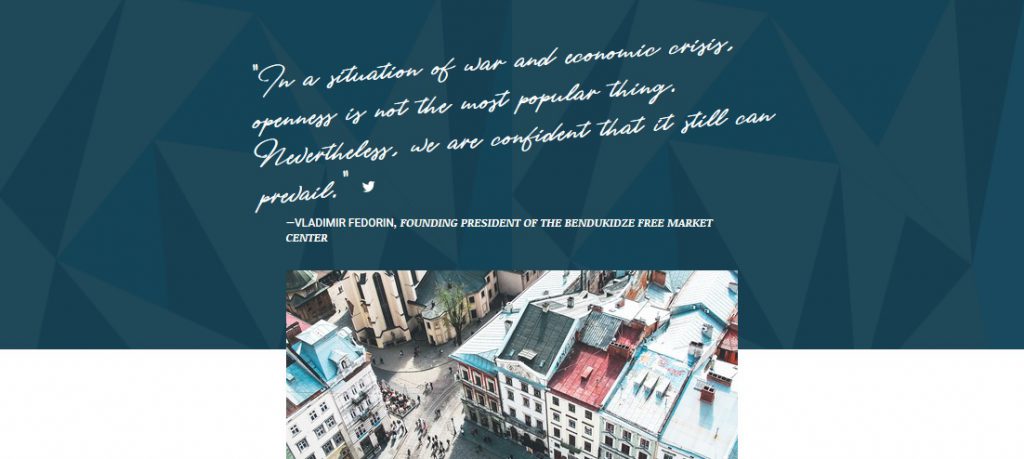
BUILDING A CLIMATE OF INNOVATION
EasyBusiness has been working to create a better climate for economic innovation and entrepreneurship for two years, and has built a strong track record of deregulatory advocacy — as well as success in implementing its recommendations.
“Our think tank evolved right after the Revolution of Dignity to assist the newly appointed government with the process of deregulation,” said Misha Obolonskyi, co-founder of EasyBusiness. “Our prime objective is to create free markets in Ukraine, enhance competition, and promote the values of freedom. For the past two years we have developed 31 policy papers, drafts of amendments to legislation, and recommendations, and 17 of them have been adopted by relevant government authorities, including six internal resolutions adopted by the National Bank of Ukraine based on our policy paper. Implementation of our recommendations have abolished more than 100 different regulations, streamlined regulatory procedures and registration procedures and aligned them with the best EU or world practices, cut the number of economic activities subject to licensure by half, and reduced the overall regulatory burden for small and medium enterprises.”
EasyBusiness has also promoted a rights-based legal system, entailing respect for the rights of investors and property holders, large or small.
“We are helping the most unprotected segment of the population, elderly people in rural areas, to stand up for their property rights,” Obolonskyi said. “In Ukraine, people who own farmland cannot sell it or use it as collateral in a bank. They can only lease it or give it as a gift. That’s a huge infringement of the property rights of about 6 million people in Ukraine. EasyBusiness developed a policy paper in which we analyzed the experience of farmland market liberalization in 60 countries, then developed an economic model that estimated the impact on the Ukrainian GDP and budget based on various scenarios of farmland market liberation.”
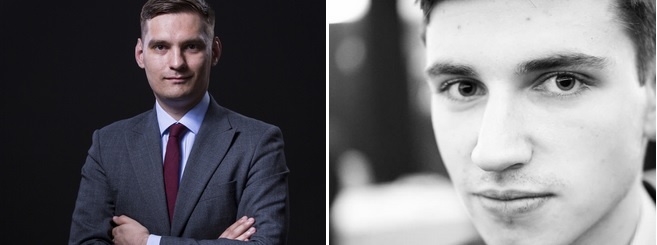
(LEFT) MISHA OBOLONSKYI, CO-FOUNDER OF EASYBUSINESS. (RIGHT) VIACHESLAV DVORNIKOV, EDITOR OF REED.MEDIA. PHOTO CREDIT: JUDD WEISS.
TAMING A MAZE OF BUREAUCRACY
Sometimes increased accessibility to government documents and information about regulatory procedures can make the most practical difference in the lives of entrepreneurs. Through its forthcoming Wikipermit website, the Ukrainian Economic Freedoms Foundation (UEFF), founded in 2015, is collating the data on every type of permission document — licenses, registrations, certificates, etc. — that are mandatory for both businesses and individuals to conduct economic activities. Ukraine’s central government requires about 1,100 such permits, and municipalities require more than 600.
“We want to publicize statistics on how often each permission document is issued, as well as its cost, refusal rate, procedure, duration of issuance, etc.,” said UEFF co-founder Maryan Zablotskyy. “We want to offer people and businesses the chance to rate each permit in terms of corruption levels associated with it, its usefulness, and the ease of each procedure.” Zablotskyy anticipates that UEFF will finish a new judicial review web portal in 2016, along with a new draft law that would abolish more of the burdensome procedures required to obtain government permission for business activities.
UEFF has achieved practical success with the abolition of 22 permission procedures for businesses in the Ukrainian agricultural sector, which takes up more than 10 percent of the country’s economy and employs approximately one out of four people in the workforce.
“The abolished procedures included the obligatory registration for certain types of fertilizers, which led to the elimination of the de-facto Russian monopoly on the local fertilizer market,” Zablotskyy said, pointing out that, as a result, Ukrainian businesses will be able to save up to $300 million per year in direct costs. “For the first time fertilizers from the EU are being imported into Ukraine without their prior registration in Ukraine, which took on average a staggering 500 days. That resulted in a significant drop of domestic fertilizer prices and greater foreign trade volumes.”
UEFF also has a special long-term focus on judicial reform. Corrupt officials in the judicial system often have enough discretionary authority to freeze assets, seize property, and violate individual rights with impunity. Judicial reform is a “mammoth task,” Zablotskyy pointed out, so it will take much more time and effort to achieve results.
A FRAMEWORK FOR PROSPERITY AND PEACE
The Center for Social and Economic Research (CASE Ukraine) is part of a broader network of CASE think tanks that includes operations in Poland, Kyrgyzstan, Belarus, Moldova, Russia, and Georgia. CASE was originally founded in 1991 in Warsaw and has operated in Ukraine since the late 1990s, when it started providing expert analysis for the country’s governments.
“CASE Ukraine was established in 1999 as a successor to the Harvard Ukraine Reform Project carried out in 1996-2000 by CASE and the Harvard Institute for International Development,” said Janusz Szyrmer, CASE fellow and chairman of the supervisory board of CASE Ukraine. “Its objectives have been to improve the knowledge of post-Soviet transition and Ukraine’s reforms; link Ukraine’s policymaking community to a global economy; contribute to capacity building for market reforms and socio-economic development of Ukraine; provide support for institutional transformation, improvements in policy process, economic policy monitoring, and education; and finally, to assist the government of Ukraine in initiation, elaboration, and implementation of comprehensive reform programs.”
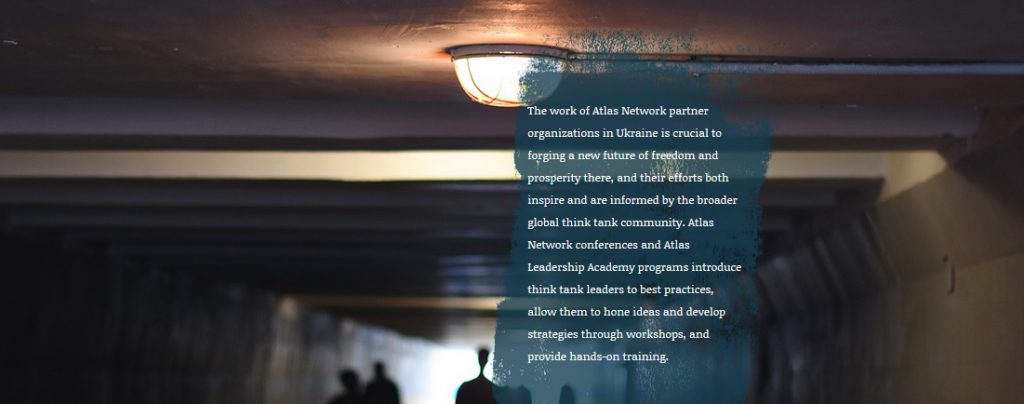
The work of Atlas Network partner organizations in Ukraine is crucial to forging a new future of freedom and prosperity there, and their efforts both inspire and are informed by the broader global think tank community. Atlas Network conferences and Atlas Leadership Academy programs introduce think tank leaders to best practices, allow them to hone ideas and develop strategies through workshops, and provide hands-on training.
“I attended the Liberty Forum in New York in November 2015, the Transatlantic CEO Summit in Windsor, and the Liberty Forum in London in June 2015,” Fedorin said. “I gleaned a lot of information and ideas from all three events, some of which we are implementing in Ukraine. For example, we were inspired by our colleagues at the Lithuanian Free Market Institute, who published a very successful economics textbook, and with their help and advice we plan to do the same in Ukraine. Our team takes advantage of online courses provided by Atlas Network, the latest one being the Think Tank Navigator, that help them improve their knowledge and skills to further our mission. Also, I cannot forget the fact that Atlas Network provided us with the $20,000 seed grant to launch Bendukidze Free Market Center. It helped us open a professional office and cover the director’s and project manager’s salaries, as well as hire a lawyer to establish the necessary legal framework for our activities. Atlas Network helped us turn a vision into a reality.”
Ukraine has languished without economic freedom for too long. The crisis of 2014 has provided the opportunity for those with the long-term interests of the country at heart to create the necessary institutional framework for prosperity and peace: limited government, secure property rights, and free markets. The efforts of these Atlas Network partners and other champions of liberty during these past two years provide a solid foundation on which they can build and expand the institutions of a free society in Ukraine.
“Ukraine has languished without economic freedom for too long. The crisis of 2014 has provided the opportunity for those with the long-term interests of the country at heart to create the necessary institutional framework for prosperity and peace.”
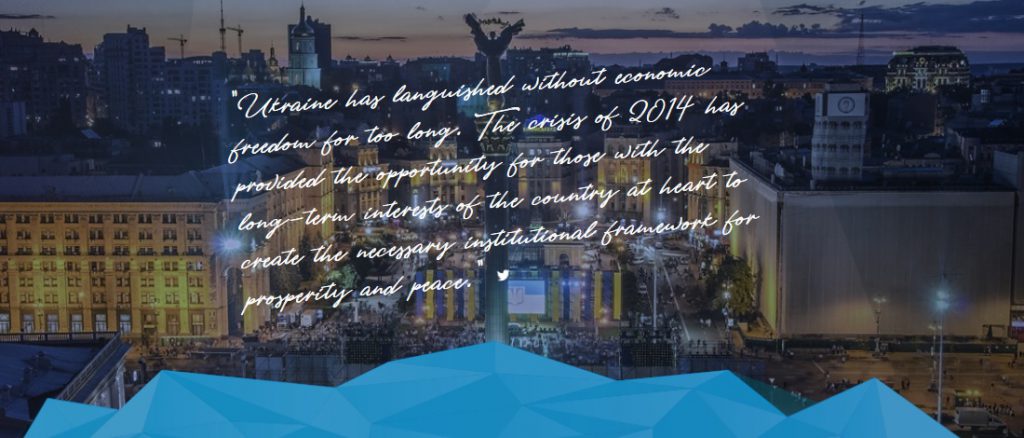
LEARN MORE ABOUT OUR PARTNERS IN UKRAINE
Bendukidze Free Market Center
Center for Social and Economic Research
EasyBusiness
Reed.Media
Ukrainian Economic Freedoms Foundation
COVER PHOTO CREDIT: VADVEN / SHUTTERSTOCK.COM

